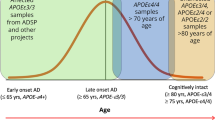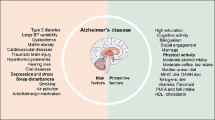Abstract
Angiotensin-converting enzyme (ACE) has shown altered activity in patients with neurological diseases. An insertion/deletion (I/D) polymorphism of the ACE gene encoding angiotensin-converting enzyme has been reported to be associated with the risk for Alzheimer’s disease (AD), and is generally considered to be a disorder primarily affecting memory. We conducted a case–control study in a sample composed of 85 sporadic AD patients and 90 age- and sex-matched controls to investigate the possible effect of the polymorphism and cognitive profile. Our data revealed an association between the ACE polymorphism and AD risk. There was a significant difference in the ACE allele or genotype frequencies between cases and controls. The D/D genotype showed an increased risk for AD and in the amnestic group and the effect was independent on ApoE genotypes.
Similar content being viewed by others
References
Amouyel P, Richard F, Cottel D, Amant C, Codron V, Helbecque N (1996) The deletion allele of the angiotensin I converting enzyme gene as a genetic susceptibility factor for cognitive impairment. Neurosci Lett 217:203–205
Arregui A, Perry EK, Rossor M, Tomlinson BE (1982) Angiotensin converting enzyme in Alzheimer’s disease increased activity in caudate nucleus and cortical areas. J Neurochem 38:1490–1492
Barnes NM, Cheng CH, Costall B, Naylor RJ, Williams TJ, Wischik CM (1991) Angiotensin converting enzyme density is increased in temporal cortex from patients with alzheimer’s disease. Eur J Pharmacol 200:289–292
Belbin O et al (2011) A multi-center study of ACE and the risk of late-onset Alzheimer’s disease. J Alzheimer’s Dis JAD 24:587–597. doi:10.3233/jad-2011-101914
Hixson JE, Vernier DT (1990) Restriction isotyping of human apolipoprotein E by gene amplification and cleavage with HhaI. J Lipid Res 31:545–548
Lehmann DJ et al (2005) Large meta-analysis establishes the ACE insertion-deletion polymorphism as a marker of Alzheimer’s disease. Am J Epidemiol 162:305–317. doi:10.1093/aje/kwi202
Lucatelli JF et al (2011) Genetic influences on Alzheimer’s disease: evidence of interactions between the genes APOE, APOC1 and ACE in a sample population from the South of Brazil. Neurochem Res 36:1533–1539. doi:10.1007/s11064-011-0481-7
Miller SA, Dykes DD, Polesky HF (1988) A simple salting out procedure for extracting DNA from human nucleated cells. Nucl Acids Res 16:1215
Miners JS, Ashby E, Van Helmond Z, Chalmers KA, Palmer LE, Love S, Kehoe PG (2008) Angiotensin-converting enzyme (ACE) levels and activity in Alzheimer’s disease, and relationship of perivascular ACE-1 to cerebral amyloid angiopathy. Neuropathol Appl Neurobiol 34:181–193. doi:10.1111/j.1365-2990.2007.00885.x
Nirmal S, Tripathi M, Shastri SS, Sagar R (2011) Association of Angiotensin-converting enzyme insertion(I)/deletion (D) genotype in Alzheimer’s disease patients of north Indian population. Int J Neurosci 121:557–561. doi:10.3109/00207454.2011.591513
Rassas AA et al (2012) High APOE epsilon 4 allele frequencies associated with Alzheimer disease in a Tunisian population. Neurol Sci Off J Ital Neurol Soc Ital Soc Clin Neurophysiol 33:33–37. doi:10.1007/s10072-011-0663-8
Snowden JS et al (2007) Cognitive phenotypes in Alzheimer’s disease and genetic risk. Cortex J Devot Study Nerv Syst Behav 43:835–845
Vardy ER et al (2012) Cognitive phenotypes in Alzheimer’s disease and genetic variants in ACE and IDE. Neurobiol Aging 33:1486. doi:10.1016/j.neurobiolaging.2010.11.003 (e1481–1482)
Wang HK et al (2006) Apolipoprotein E, angiotensin-converting enzyme and kallikrein gene polymorphisms and the risk of Alzheimer’s disease and vascular dementia. J Neural Transm (Vienna, Austria: 1996) 113:1499–1509. doi:10.1007/s00702-005-0424-z
Wang XB, Cui NH, Yang J, Qiu XP, Gao JJ, Yang N, Zheng F (2014) Angiotensin-converting enzyme insertion/deletion polymorphism is not a major determining factor in the development of sporadic Alzheimer disease: evidence from an updated meta-analysis. PloS One 9:e111406. doi:10.1371/journal.pone.0111406
Zhang JW, Li XQ, Zhang ZX, Chen D, Zhao HL, Wu YN, Qu QM (2005) Association between angiotensin-converting enzyme gene polymorphism and Alzheimer’s disease in a Chinese population. Dement Geriatr Cogn Disord 20:52–56. doi:10.1159/000085075
Zhang Z et al (2012) Association of angiotensin-converting enzyme functional gene I/D polymorphism with amnestic mild cognitive impairment. Neurosci Lett 514:131–135. doi:10.1016/j.neulet.2012.02.074
Acknowledgments
This work was funded by the Ministry of Higher Education and Scientific Research in Tunisia. Faculté de médecine, Tunis. Research Laboratory “temporal lobe pathology” CHU Charles Nicolle, Tunis. This project is conducted within the framework of MOBIDOC-Post doc as specified in PASRI program, funded by the EU and managed by the ANPR.
Author information
Authors and Affiliations
Corresponding author
Ethics declarations
Conflict of interest
The authors declare that they have no conflicts of interest concerning this article.
Rights and permissions
About this article
Cite this article
Achouri-Rassas, A., Ali, N.B., Cherif, A. et al. Association between ACE polymorphism, cognitive phenotype and APOE E4 allele in a Tunisian population with Alzheimer disease. J Neural Transm 123, 317–321 (2016). https://doi.org/10.1007/s00702-015-1468-3
Received:
Accepted:
Published:
Issue Date:
DOI: https://doi.org/10.1007/s00702-015-1468-3




